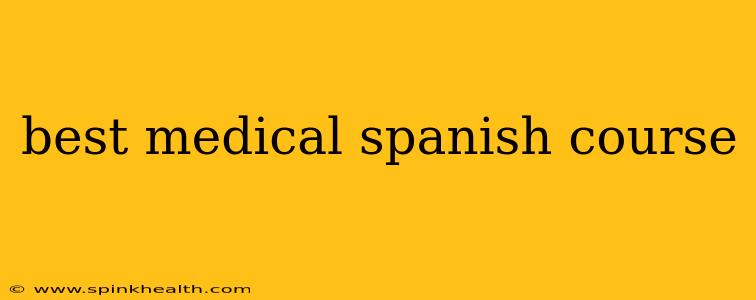Finding the Best Medical Spanish Course: A Doctor's Journey (and Yours!)
Learning Medical Spanish isn't just about memorizing vocabulary; it's about bridging a crucial communication gap and providing better care. My journey to fluency wasn't a straight line – it was filled with trial and error, late nights with textbooks, and a healthy dose of frustration. But the rewards, both professional and personal, have been immeasurable. This article shares my experiences and helps you find the best medical Spanish course for your needs.
I remember my first encounter with a Spanish-speaking patient. The anxiety was palpable. My rudimentary Spanish, gleaned from college classes, felt woefully inadequate. I stumbled over words, missed vital information, and felt a profound sense of failure. That experience ignited my passion for mastering medical Spanish – a journey that led me to explore numerous courses, each with its own strengths and weaknesses.
What Makes a Medical Spanish Course "Best"?
Before diving into specific recommendations, let's define what constitutes the best course. For me, it boiled down to these key elements:
- Comprehensive Curriculum: A good course covers not only basic vocabulary but also the nuances of medical terminology, phrasing specific to consultations, and culturally sensitive communication.
- Interactive Learning: Passive learning is ineffective. The best courses incorporate interactive exercises, simulations, and real-world scenarios to solidify your understanding.
- Qualified Instructors: Experience in both language teaching and medicine is invaluable. Instructors who understand the complexities of both fields can provide insightful guidance.
- Flexible Learning Options: Life is busy! The best course should offer flexibility – self-paced learning, mobile accessibility, and varied formats (video, audio, written materials).
- Practical Application: The ultimate test of any language course is its real-world application. The best courses provide opportunities to practice with native speakers.
Is there a free Medical Spanish course?
Finding completely free, comprehensive medical Spanish courses is challenging. While many resources offer free introductory materials or sample lessons, a full, structured course usually requires a fee. However, you can supplement paid courses with free resources like:
- Online dictionaries: Medical dictionaries specialized in Spanish will be invaluable.
- YouTube channels: Many channels offer free Spanish lessons, some focusing on medical vocabulary. However, always verify the credibility of the source.
- Podcasts: Listening to podcasts in medical Spanish, even if you don't understand everything at first, helps with pronunciation and familiarization with medical terminology.
What are some good resources for learning medical Spanish?
This is where personal preference comes into play. Some people thrive in structured classroom environments, while others prefer self-paced online learning. Some excellent options include (remember to research current offerings and reviews before enrolling):
- Online platforms: Several reputable online learning platforms offer medical Spanish courses. Look for courses with high ratings and detailed curricula.
- University extension programs: Many universities offer non-credit courses or certificates in medical Spanish. These courses often provide a structured learning environment and interaction with instructors.
- Language exchange programs: Pairing with a native Spanish speaker who is interested in learning English can provide valuable conversation practice.
What is the best way to learn medical Spanish fast?
There's no magic bullet for fast language acquisition. However, consistent effort and smart strategies accelerate the process:
- Immersion: Surrounding yourself with the language as much as possible, through media, conversations, and even labeling objects in your home with their Spanish names.
- Spaced repetition: Learning vocabulary and phrases in intervals helps with retention. Flashcards and language learning apps can be very useful.
- Focus on practical vocabulary: Prioritize learning the medical terms and phrases most relevant to your daily practice.
- Consistent practice: Even short, daily practice sessions are more effective than infrequent, long sessions.
How long does it take to learn medical Spanish?
This depends entirely on your learning style, the intensity of your study, and your prior language learning experience. It's a marathon, not a sprint. Be patient and celebrate your progress along the way.
My journey to fluency in medical Spanish was a challenging yet rewarding one. It transformed my professional life and deepened my connection with patients. I hope this guide helps you on your own path to mastering this vital skill. Remember to choose a course that best suits your learning style and commitment level, and most importantly, enjoy the process!

